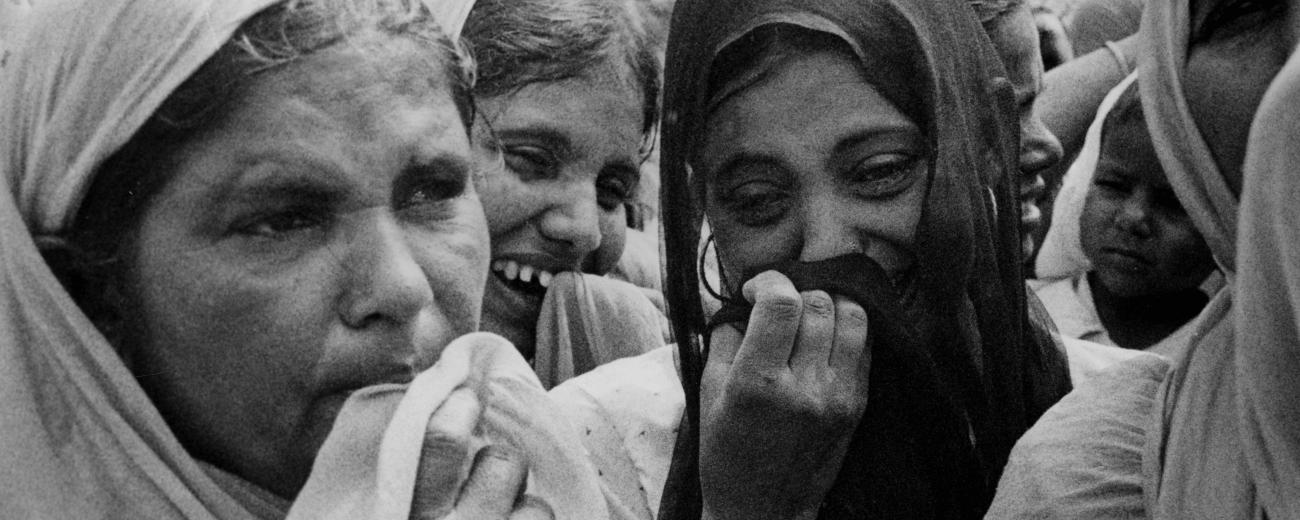
Day of Reflection and Commemoration of the November 1984 massacres of Sikhs and honour the victims of genocide

Key information
- Date
- Time
-
5:00 pm
- Venue
- SOAS, University of London
- Room
- Khalili Lecture Theatre
About this event
To mark the 40th anniversary of the November 1984 anti-Sikh pogroms, a panel of experts, witnesses, and personalities will discuss the traumatic events following the assassination of the Indian Prime Minister, Indira Gandhi, and the anti-Sikh violence that followed.
The 1984 Sikh Archive will also be launched—an evidence-led, online educational archive documenting the events of 1984, their causes, and consequences.
The panel will include Jassa Ahluwalia, actor, author, and trade unionist; Shyam Bhatia, Indian-born British journalist, writer, and war reporter; Uma Chakravarti, feminist historian, and filmmaker; Harvinder Singh Phoolka, Senior Advocate of Delhi High Court and author; Professor Gurharpal Singh, Emeritus Professor of Sikh and Punjab Studies, SOAS; Jasvir Singh CBE, family law barrister and BBC Radio 4 'Thought for the Day' contributor; Pav Singh, author, publisher, and campaigner; and Sanjay Suri, author and political editor, Europe, for CNN-IBN television. Both Sanjay Suri and H.S. Phoolka will be joining remotely from the US and India respectively.
About the speakers
Jassa Ahluwalia is a British actor, writer, filmmaker, and trade unionist. Born in Coventry to a white English mum and a brown Punjabi dad in 1990, he attended school in Leicester and was raised in an extended family environment. He spoke English in the playground, Punjabi with his grandparents, and spent various summer holidays in India. He came to prominence as Rocky in the hit BBC Three series Some Girls, followed by starring roles in Unforgotten, Ripper Street, and Peaky Blinders. He is author of Both Not Half (Bonnier Books, 2024) which explores mixed identity in light of his own British-Indian heritage.
Shyam Bhatia is an Indian-born British journalist, writer, and war reporter based in London. He has reported from conflict zones such as the Middle East, Afghanistan, and Sudan and is a former diplomatic editor of The Observer. He has also served as US correspondent and Foreign Editor of the Bangalore-based Deccan Herald and Editor of Asian Affairs magazine in London. He reported on the violence against the Sikhs in Delhi in November 1984.
Uma Chakravarti is a feminist historian and filmmaker. She has written widely on Buddhism, the nineteenth century, gender, caste, and labor and has an ongoing interest in the history of marginalized groups. Gendering Caste: Through a Feminist Lens (2003) brings together many of these concerns. Currently, she is working on a book tentatively titled The Dying Lineage: The Politics of Reproduction in the Mahabharata. Among her recent works is an edited collection titled Thinking Gender, Doing Gender: Pedagogies, Histories, Cultural Practices (2016). Her films dwell on the lives of unknown women and have been screened widely in India and abroad.
Harvinder Singh Phoolka is a senior advocate of the Delhi High Court, politician, human rights activist, and author. He served as the Leader of the Opposition in the Punjab Legislative Assembly. He is known for spearheading what is described as "one of the longest and most torturous legal battles" and "crusades" to gain justice for the victims of 1984 anti-Sikh pogroms and fighting individual cases on the involvement of Congress-I leaders H. K. L. Bhagat, Sajjan Kumar, and Jagdish Tytler despite the government cover-up. Published work, When a Tree Shook Delhi: The 1984 Carnage and its Aftermath (Lotus, 2008, co-authored with Manoj Mitta).
Gurharpal Singh is Emeritus Professor of Sikh and Punjab Studies, SOAS University of London. Since 1984, he has published extensively on Punjab and Sikh studies, including Ethnic Conflict in India: A Case Study of Punjab (Palgrave, 2000). His most recent volume is Sikh Nationalism: From a Dominant Minority to an Ethno-Religious Diaspora (Cambridge University Press, 2022, with G. Shani).
Jasvir Singh CBE is a prolific activist within the British South Asian community. He is an established family law barrister who has been practicing for over 17 years and is based in London. He is a trustee and patron of several regional and national charities within the faith and minorities sector, including City Sikhs, the Kaleidoscope Trust, and the Faiths Forum for London. He is a regular contributor to BBC Radio 4’s Thought for the Day and is a co-founder of South Asian Heritage Month.
Pav Singh has been instrumental in campaigning on the issues surrounding the 1984 massacres as a member of the National Union of Journalists. In 2004, he spent a year in India researching the full extent of the pogroms (from which members of his extended family narrowly escaped) and the subsequent cover-up. In his role as a community advocate at the Wiener Holocaust Library, London, he helped curate the exhibition 'The 1984 Anti-Sikh Pogroms Remembered' in 2014 with Delhi-based photographer Gauri Gill. He is the author of 1984 India’s Guilty Secret (Kashi House and Rupa, 2017) and the editor and publisher of the 1984 Sikh Archive.
Sanjay Suri is currently the London correspondent for CNN News18 Television. In 1984, he was a crime reporter with the Indian Express and reported from both Punjab and Delhi. He covered the Delhi killings following the assassination of Indira Gandhi and is the author of 1984—the Anti-Sikh Violence and After (HarperCollins, 2015).
Image credit: Sondeep Shankar


